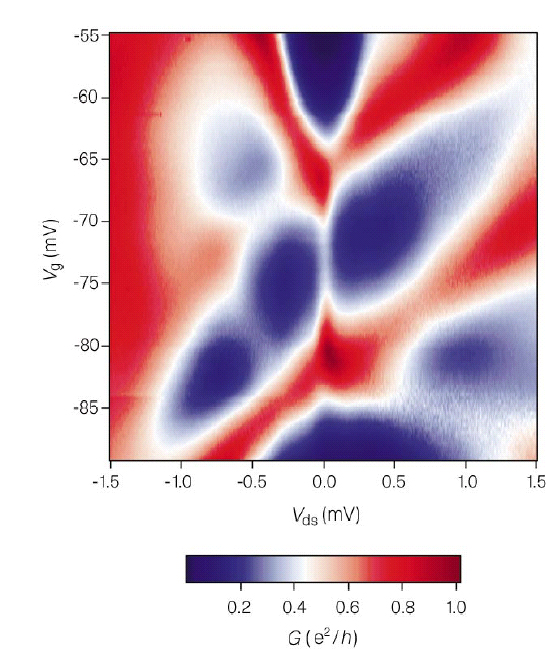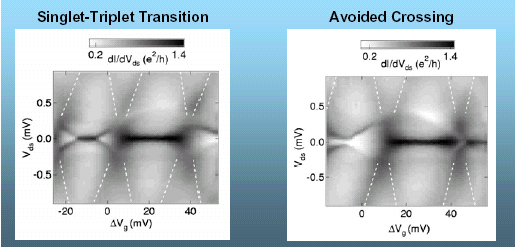|
|
Research Project:
Magnetic Field and Temperature Dependence
of Singlet-Triplet Transition in a Single-Electron Transistor
Background Work
Our group studies electron transport in a single-electron
transistors (SETs), or quantum dots, or "Artificial Atoms" (See:
Marc Kastner's article: Part
1; Part
2). We observed Coulomb blockade "diamonds" in the
differential conductance as a function of the gate voltage and the
drain-source voltave in SETs.
"Effects of Quantum Levels on Transport
Through a Coulomb Island", E. B. Foxman, P. L. McEuen, U. Meirav,
N. S. Wingreen, Y. Meir, P. A. Belk, N. R. Belk, M. A. Kastner,
and S. J. Wind, Phys. Rev. B 47, 10020-10023(1993)

Early Kondo Work
"Kondo Effect in a Single-Electron Transistor",
D. Goldhaber-Gordon, H. Shtrikman, D. Mahalu, D. Abusch-Magder,
U. Meirav, and M. Kastner, Nature, Vol 391, 156 (1998)
Due to the interaction between the localized electrons
on the quantum dot and the delocalized electrons in the source and
drain of the sample, a nonzero spin on the quantum dot gets screened due
to the formation of a many-body singlet, i.e. the Kondo Effect
 The above figure is obtained from D. Goldhaber-Gordon's
article. The vertical white line in the middle of the figure
indicates a peak of differential conductance inside a "diamond", corresponding
to a zero-bias peak for an odd number of electrons inside the quantum
dot.
The above figure is obtained from D. Goldhaber-Gordon's
article. The vertical white line in the middle of the figure
indicates a peak of differential conductance inside a "diamond", corresponding
to a zero-bias peak for an odd number of electrons inside the quantum
dot.
Recent Work
"Singlet-triplet transition in a single-electron transistor at
zero magnetic field", A. Kogan, G. Granger, M. A. Kastner,
D. Goldhaber-Gordon, and H. Shtrikman Phys. Rev. B 67, 113309 (2003)
When there is an odd number of electrons in the quantum dot, we
generally see the Kondo peak at zero drain-source bias, as in the
figure above. For an even number of electrons, we sometimes observe Kondo
peaks corresponding to the triplet excited state. When we
increase the gate voltage, the triplet excitation energy decreases until a
new zero-bias Kondo peak is formed, corresponding to a
Kondo-screened triplet ground state. In other words, the change of the shape
of the potential that confines the quantum dot in the SET due to
the change in gate voltage results
in a singlet-triplet transition in zero magnetic field.

Future Work
Magnetic Field and Temperature Dependence
Our next goal is to investigate the magnetic field and
temperature dependence of the singlet-triplet transition in order
to test theoretical predictions (see article "Singlet-Triplet
Transition in Lateral Quantum Dots: A Numerical Renormalization
Group Study", W. Hofstetter and G. Zarand
Phys. Rev. B 69, 235301 (2004)).
|